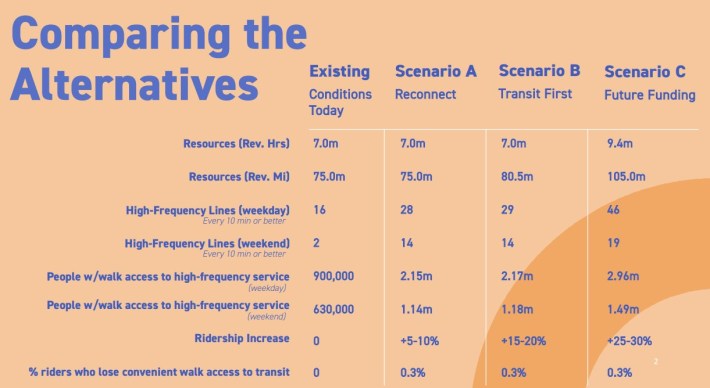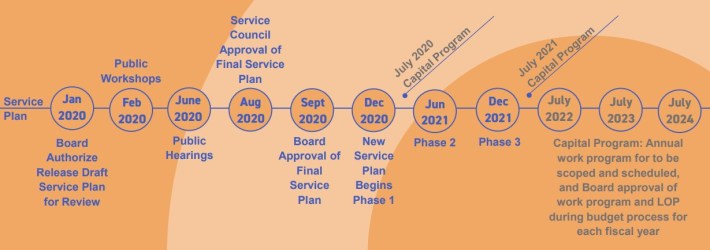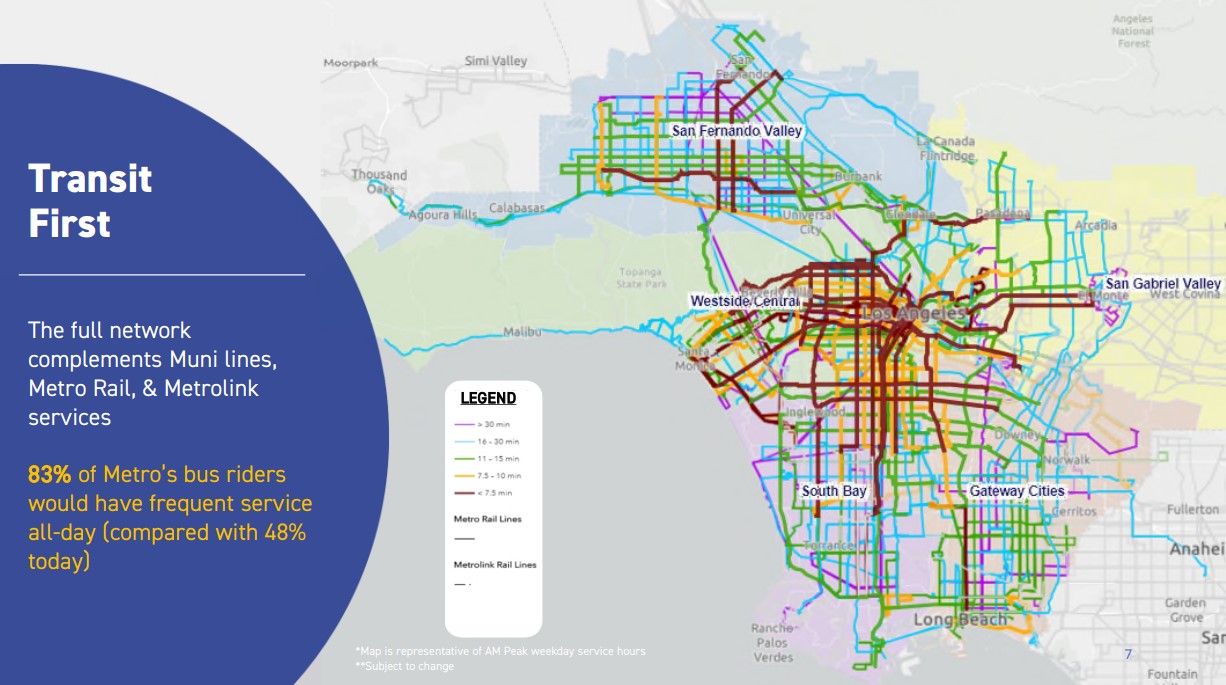There's a lot to like in Metro's long overdue NextGen Bus service re-organization.
Metro's extensive bus system is a workhorse that carries nearly a million riders every weekday, but ridership is declining. In 2013 Metro saw more than a million riders daily; average weekday ridership then was 1,086,000 to 1,199,000. This has declined in recent years; for 2019 averages were 788,000 to 954,000.
Some factors causing the decline are outside Metro's direct control. But there is a lot the agency can do to increase ridership.
Re-tooling bus networks for frequent service is a proven strategy for increasing ridership. Many cities across the U.S. have already done this successfully: Houston, Richmond, Columbus, Indianapolis, Austin and Seattle. More are on the way, including Miami and Dallas. Some network redesigns are better than others; Baltimore's 2017 redesign may have resulted in some meager benefits, but failed to increase ridership.
Metro's NextGen basic network redesign is projected to increase bus ridership by 5-10 percent. Rosier scenarios - involving more currently-unfunded capital investment - show a potential ridership increase of 25-30 percent - over the next half-decade.

Will Metro's NextGen redesign be more of a Houston-style success or more of a Baltimore-style muddle? The devils could be in the details - and though there is quite a bit of information available (see the end of this staff report appendix for 8 pages worth of fine print on what lines are changing and how) many of the final on-the-ground details have not been released.
Stops will be thinned, but which ones? We'll see.
Some lines will be truncated for "layover optimization" but just where are the new layover locations? Not clear yet.
Metro is going to have an interactive NextGen trip calculator so folks can see ride times. It's supposed to be up and running tomorrow, February 1 - see Metro's NextGen Bus Study project webpage.
I worry that the positive aspects of the study could get watered down before implementation gets underway.
The bus redesign is long overdue. Metro worked up an in-house Blue Ribbon Committee frequent bus service network re-organization, which was approved in 2015, slated for implementation in mid-2016, then quietly shelved. Metro's NextGen service improvements had been scheduled for April 2020, but now changes are planned to start in December 2020 - and continues in June and December of 2021.

Metro does twice-yearly service adjustments, which generally means cutting the system by about one percent. Then annually Metro adjusts its budget, "right-sizing" operations moneys to match small decreases in ridership.
The bus network declines from a thousand cuts. Instead of - as is done in Seattle - being gradually improved by a thousand small improvements. In Better Buses, Better Cities, Steven Higashide writes that "The way to make buses better tends to be thousands of little projects, and none of them is particularly exciting to an elected official." Metro has made some improvements - including all-door-boarding on just three lines - but has largely allowed its bus system to freeze and gradually degrade.
Flush with sales tax revenue, Metro is one of the best-funded transit agencies in the nation. The bus system just hasn't been Metro's priority; the agency favors dedicating any discretionary monies to capital construction, largely rail and highways. Perhaps letting bus service get worse means that a big NextGen redesign can look great when it's just returning ridership to levels that were just normal in 2013.
Despite my frustration and skepticism, all in all, NextGen will be an important step in the right direction. Political pressure is needed to make sure it's as big a step as possible.
SBLA readers should plan to attend an upcoming NextGen meeting - starting tomorrow and continuing for a couple months. From the SBLA calendar:
- Starting Saturday 2/1 – Metro will host a series of more than 20 public workshops on its NextGen Bus service reorganization. February workshops include:– Saturday 2/1 from 10 a.m. to 1 p.m. at L.A. Trade Technical College Aspen Hall TE-101, AT 2215 S. Grand Avenue in South L.A. (Facebook event)– Tuesday 2/4 from 4-7 p.m. at Grand Annex at 434 W. 6th Street in San Pedro– Wednesday 2/5 from 4-7 p.m. at Marvin Braude Constituent Center, 6262 Van Nuys Boulevard in Van Nuys– Monday 2/10 from 4-7 p.m. at El Monte Station, 3501 Santa Anita Avenue in El Monte– Wednesday 2/12 from 4-7 p.m. at Plummer Park, 7377 Santa Monica Boulevard in West Hollywood– Thursday 2/13 from 4-7 p.m. at the Clearwater Building, 16401 Paramount Boulevard in Paramount– Wednesday 2/19 from 4-7 p.m. at East Los Angeles College, 1301 Avenida Cesar Chavez in Monterey Park– Thursday 2/20 from 4-7 p.m. at Pasadena Senior Center at 85 E. Holly Street in Pasadena– Saturday 2/22 from 10 a.m. to 1 p.m. at Metro Board Room, One Gateway Plaza in Los Angeles– Tuesday 2/25 from 4-7 p.m. at Bell Community Center at 6250 Pine Avenue in the city of Bell– Wednesday 2/26 from 4-7 p.m. at The Foundation Center, 11633 S. Western Avenue in South Los Angeles– Thursday 2/27 from 4-7 p.m. at Rose Goldwater Community Center, 21710 Vanowen Street in Canoga ParkMany additional NextGen workshops will take place in March. For full schedule and project information, see events tab at Metro NextGen webpage.






